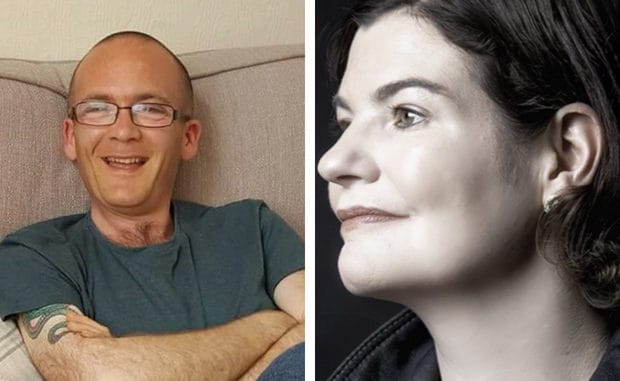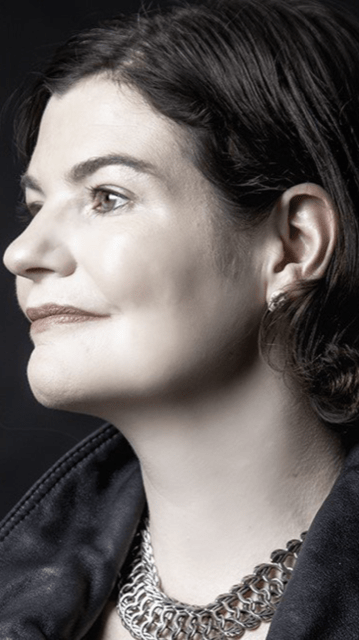
Last week columnists Matthew and Melissa went toe to toe on the issue of grammar. Melissa said we should not get fixated and make people feel ashamed over their grasp of English. Matthew said grammar matters and we need it to be understood clearly.
Those who voted in our poll were with Matthew by 60.9% to 34.4%, with just over 4% undecided.
This week Matthew and Melissa go head to head over the monarchy.
Melissa says:

It’s reckoned around two billion people watched H&M’s wedding, worldwide. Two billion! More than a quarter of all humans! Who even knew so many people had tellies and laptops, eh?
Now, at a generous estimate, that wedding cost £46 million, the majority of which was anyway privately funded. But however it was funded, that seems to represent extraordinary value for money. Around 2.3p per view.
There are lots of good reasons to be opposed to the Royal Family. I hate the idea of hereditary principle myself. The idea that my son, bright and talented though he be, will never take the top job in this country, simply because he was born to the wrong family? That absolutely stinks.
But to oppose the money the Royal Family cost is simply nonsensical. They showcase Britain to the world, make us appear interesting and sexy, rather than the tiny irrelevant insular island we might otherwise appear. They bring tourists here, in droves. It’s predicted the wedding will bring £1.43 billion to the UK economy, through tourism, PR value, retail, fashion, and merchandise.
So to complain about that £46 million the wedding cost is akin to my husband complaining about the £150 I spend on petrol each month. Yes, it’s a fortune. Yes, feeding homeless orphans with that £150 would ostensibly seem nobler. But without it, I can’t do my job. Without it, I’m stuck at home, dribbling on the sofa, not earning a bean or promoting myself, getting in his way, wasting my time, not pulling my weight. With that £150 I can easily earn ten times as much. That expense claim is an investment into my future. And putting on a wedding for the world is the Royal equivalent.
And what a wedding it was! Did you see it? I didn’t. I was working. But I saw the highlights. A mixed race woman married a prince, as her black mother looked on with pride; a black church leader quoted Martin Luther King, lecturing the congregation on slavery, revolution, spiritual music, the resilience of faith. Don’t tell me that isn’t amazing. Britain’s history and future is being transformed before our eyes, in the most exciting, unexpected, glittering showcase.
To appeal to two billion people, worldwide, is simply staggering. If you believe in democracy, you cannot fail to applaud that. People love the Royals. They love the fairy tale, the soap opera, the gossip, the raw human emotion. Be as snooty about it as you like; it remains true. Women like my mum, who watched every second of coverage, and shed the odd tear for two people in love, saying their vows against all the odds. She’s paid taxes all her life: she deserves the occasional show for her money. Plenty of women, particularly, love a wedding. I got married myself last year, so I can attest to that. How swiftly I took to carrying a taser down Broadstairs high street to fend off the women who barely knew me, or him, but were still desperate for an invite: how swiftly, nonetheless, the wedding grew from a dozen intimates to more than 200 guests, all desperate to share our joy. Who were we to deny them?
I’m director of a theatre company now, and I’ve been busy applying for national lottery funding this month, seeking money for high art from the poorest people in our society. And I’m embarrassed about it. People who would feel cowed and anxious at the thought of entering a theatre are nonetheless going to pay for my ambitions, via their taxes and lottery flutter. If I get 100 people in the audience I’ll call myself blessed. And yet I’m meant to begrudge the two billion their enjoyment of a televised wedding, all show tunes, hope, razzle dazzle and sequins? What kind of smug, snooty, misogynistic, hypocritical snob would do that?
Not me. I didn’t watch, but I’m glad it happened, and I’m glad they put on a proper show for the world. Tourists don’t line the streets to see poor people be housed decently. I wish they did (do I, or would that be weird?) but they don’t. They line the streets for love, history, pageantry, tradition and razzamatazz. And last weekend they got it by the bucket. And I’m thrilled. I begrudge them not a penny, not a second.
And if you do, don’t call yourself a democrat.
Matthew says:

The abolition of the monarchy. An end to a hereditary head of state. An elected president, chosen entirely by the electorate, who can then vote the candidate out just as easily as we voted them in. An end to privilege and a right to rule.
Have I set your teeth on edge enough yet? Because that’s what often happens when we discuss this anachronism of our government; it feels an affront to challenge the orthodoxy that the royal family are A Good Thing, doesn’t it? There’s something not quite right about it. Well, I’m always up for a challenge, and I’d like to offer an alternative point of view to Mrs Todd.
We don’t need a royal family. In fact, I’m going to go as far as saying that there are far better ways to choose our head of state. A president? Abolishing the post entirely? My friend Kirk thinks that we should have a Mayor of Britain, elected yearly. I admire the radical concept, although I’d personally settle for an elected president on a four or five year term.
Why am I anti-monarchy? More than a few reasons, but let me share the most important ones with you.
The monarchy has political power
Don’t believe me? In the event of an election which doesn’t give a decisive result, the monarch has real powers to decide who should form a government. Our present monarch, Queen Elizabeth II, has been actively involved in determining the appointment of Prime Ministers in 1957 (Harold McMillan), 1963 (Alec Douglas-Home), and 1974 (Harold Wilson).
In 1975, the queen’s representative in Australia dismissed the Australian Prime Minister, Gough Whitlam, despite having a clear electoral majority of the lower House; their constitution didn’t allow the people to make the final choice of government – the actual power lies with the monarch or their representative. Whilst they don’t often use that power due to the conventions of the time, they can still use it should they choose. Did you vote for that? I certainly didn’t, and I’d rather have a head of state who I can help to remove if I don’t agree with their policies or view.
The monarchy interferes in our day-to-day political life
The monarch (and her family) exercises real political power. Civil servants produce regular briefings on domestic and foreign policy for the Queen and other royals. The Prime Minister has a weekly meeting with the Queen to discuss current policy issues, and Government departments regularly receive requests for briefings on specific issues from the Queen and other senior royals. The royals are not getting all these briefings – over and above what they can read in the newspapers – out of idle curiosity. It’s no secret Prince Charles and his staff have had protracted discussions with civil servants and ministers on policy issues close to his heart. Their responses are fed into the decision-making at the heart of government, purely on the basis of a family who have been appointed to the position of royalty; no election required, and no choice from us.
They’re expensive.
Much of the monarchy’s costs are met by the civil list, which covers the running of the royal household. This includes the cost of staffs, catering and hospitality, administration, and any ceremonial functions. Any other costs (such as royal trips and the upkeep of royal castles) are met by government departments through grants from Parliament.
The Queen’s sovereign grant, the amount she receives from taxpayers, is calculated as a percentage of Crown Estate profits. In November 2017, it was revealed that the percentage would rise for 10 years from 15% to 25%. The Queen’s share of the last year’s profits will amount to £82.2m. Prince Charles’ organisation, the Duchy of Cornwall, is exempt from corporation and capital gains tax.
So what? I might hear you cry. The monarchy pays for itself a hundred fold through tourism. Right? No. Edinburgh Zoo regularly pulls in more visitors annually than Buckingham Palace. Indeed, Windsor Castle, with 1.3 million visitors between 2016/17, attracted roughly 700,000 fewer people than the Riverside Museum in Glasgow.
And do people really come here to see the Queen? How many of our tourists at Buckingham Palace genuinely expect to see meet Elizabeth R taking in the air? Do people believe that they’ll bump into Prince Harry strolling round Kensington Palace? Are they peering out their plane window as they taxi onto the runway at Heathrow, wondering when Prince Phillip is going to jump out of the business class lounge and wave genially at them whilst swearing at the foreigners?
No, of course not. Tourists are visiting the buildings and the history, the emotions tied up in our long and proud heritage, not a family who aren’t in when they are coming knocking. If the royal family all retired tomorrow, the tourists would still come and spend money in our fair isles, and we’d still hold regular events that attracted visitors. Look at any country that has an elected head of state – does their tourism suffer? No, and neither would ours.
It’s not a fair and equal system.
What do France, Germany, and the USA all have in common? Their heads of state are chosen by their citizens (decidedly not subjects) and can be voted out in free and fair elections. Let me put it another way; why should someone be given the opportunity to be head of the nation because of their birth order? The notion of “accident of birth” does not make them fit to hold office; monarchists will often argue the point that future monarchs are trained from birth – although I’ve never had a satisfactory explanation as to what that training actually looks like, and why no-one else can undertake that training as well.
What makes Elizabeth better able to be queen than my mum? Elizabeth seems rather pleasant (although we’ve never met, which I can only assume is an oversight on the part of her staff), and my mum is exceptionally lovely, so why couldn’t my mum – with the right training – become the next queen of the UK? Because she wasn’t born into the “right” family. What’s wrong with that picture? It’s saying that people can’t become head of state because they’re not suitably trained.
That’s tosh – in the same way that anyone can stand for election (with a few exceptions) to Parliament and learn about the role, so can anyone run for president. The world does not collapse when a new president of France is chosen, and we must all remember one thing about the current American president – he has the ability to be voted out of office if enough people agree with you. He can also be impeached. If he was king of England, what would our choices be?
Why do we need a monarchy? People in favour of keeping it will say that the current system symbolises the unity, history, and traditional values of this country, and taking it away will demolish everything that represents Britain. But this feudal system is outdated, and we are citizens, not subjects. We deserve leaders at all levels of government who are representative of us as a people, and the only way that will happen is if we get to choose who those leaders are – all of them.

